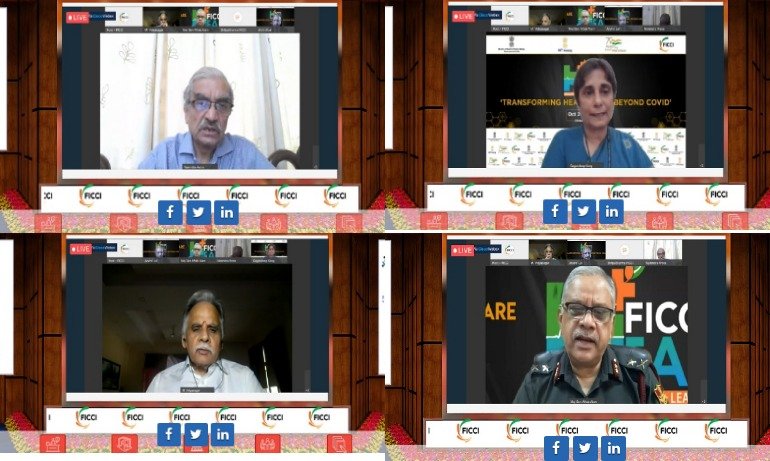Experts discuss winning strategies for India in combatting future pandemics
October 21, 2021 | Thursday | News
A Public Health Debate organised by FICCI
India has suffered two infection waves in the past months with catastrophic human and economic loss, while also carrying out one of the biggest and most ambitious vaccination drives. The situation, however, still remains uncertain and dire.
Federation of Indian Chambers of Commerce and Industry (FICCI) jointly with the Ministry of Health and Family Welfare and NITI Aayog has organized a three-day ‘Heal 2021-Transforming Healthcare beyond COVID-19’ from 20-22 October, 2021 virtually. On 20th October, 2021, the public health debate on ‘COVID-19 Pandemic- What could be India’s winning strategy?’ took place with experts putting forward their thoughts and recommendations.
Brig Dr. Arvind Lal, Chair, FICCI Swasth Bharat Task Force, Executive Chairman, Dr Lal PathLabs and Managing Trustee, ALVL Foundation posed three main questions of concern during the debate, “How can we minimise the reaction time to an approaching wave of COVID-19? What needs to change in India’s Vaccination Strategy? Can we predict the next wave of COVID-19?”.
Addressing these concerns, Dr. N.K. Arora, Head, COVID-19 Working Group of National Technical Advisory Group on Immunisation said, “This pandemic has shown us that health and wealth are two sides of the same coin. I think one of the key parameters of our winning strategy so far and will be is that while there is no hesitation of inter-country and intra-country global collaboration and learning from each other’s mistakes, the under-pinning has to be that we have to be ‘atmanirbhar’ as far as managing the pandemic is concerned. We have converted this tragedy into an opportunity. We have to move from vaccine manufacturing to vaccine development.”
Major General Aftab Alam, Assistant Chief, Integrated Defence Staff, Medical, Ministry of Defence, Government of India remarked on the role of armed forces in setting up emergency hospitals and how discipline, capability building and training helped them survive.
Adding on her views, Dr. Gagandeep Kang, FRS, Professor, Christian Medical College, Vellore and vaccine expert spoke from a scientific perspective and research standpoint, “What we have learnt from the pandemic is that in India we can do the science, we can do the manufacturing but frequently we do not have it at the stage where it is ready for translation. We need to be intentional about the research we are doing.” She also said, “Right now there are no variants of concern. We need to keep this up. Often we build up when need is there and then drop back. I hope we don’t make the same mistake this time.”
Prof M. Vidyasagar, Distinguished Professor, Indian Institute of Technology, Hyderabad further elucidated the importance of predictive modelling, tracking and serological surveillance in predicting virus transmission, “I think the current role is that if there is a new variant of concern, how much time do we have to detect that and plan moves going forward. Predictive modelling will give the planning committee at least three to four weeks of head start. You have to plan things now when there is less pressure.”
Indeed, COVID-19 is not going away soon and therefore, it is imperative that we answer the required questions as timely as possible to devise a winning strategy for India to alleviate the effects of this situation and any future pandemics.









